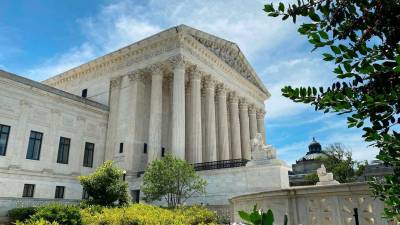WASHINGTON: The US Supreme Court will scrutinise presidential powers in major cases during its new term opening on Monday.
Justices will examine the legality of President Donald Trump’s sweeping tariffs and his authority to fire Federal Reserve officials.
The court with its 6-3 conservative majority has moved American law dramatically rightward under Chief Justice John Roberts.
Cases involving culture war issues like race, gun rights, gay conversion therapy and transgender sports participation are also on the docket.
Arguments on November 5 will address challenges to Trump’s tariffs from 12 US states and various businesses.
A lower court previously ruled that Trump overstepped his authority by imposing most duties under an emergency law.
Bradley University professor Taraleigh Davis highlighted the massive economic stakes in the tariff case.
“If Trump loses, existing tariffs could be invalidated immediately, disrupting markets and trade negotiations,” Davis said.
“If he wins, it confirms presidents can unilaterally reshape the economy through tariffs without congressional approval.”
The court will hear arguments in January concerning Trump’s attempt to remove Federal Reserve Governor Lisa Cook.
This marks the first legal test of presidential authority to fire a Fed official and challenges central bank independence.
Congress created the Fed in 1913 with provisions shielding it from political interference by requiring removal only “for cause.”
A judge ruled Trump’s fraud claims against Cook likely provided insufficient grounds for removal under this law.
Cook, the first Black woman Fed governor, called Trump’s claims a pretext to fire her over monetary policy differences.
Justices in December will hear arguments about Trump’s firing of Federal Trade Commission member Rebecca Slaughter.
This case gives conservative justices an opportunity to overturn a 1935 precedent protecting agency leaders from presidential control.
The court allowed Trump to remove Slaughter while her legal challenge proceeds through the system.
More major presidential power cases could emerge including Trump’s bid to limit birthright citizenship.
The court’s conservatives have backed Trump in almost all emergency requests during litigation.
The term’s first major case on Tuesday involves a challenge to Colorado’s ban on gay conversion therapy for minors.
A Christian counselor claims the Democratic-backed law violates First Amendment free speech protections.
Later this term, justices will hear bids by Idaho and West Virginia to enforce bans on transgender athletes in female sports.
Conservatives get another chance to expand gun rights in a challenge to Hawaii’s handgun restrictions on private property.
Arguments on October 15 will examine a Louisiana electoral map that increased Black-majority congressional districts.
This case provides opportunity for the conservative majority to gut a key provision of the Voting Rights Act.
The court will also hear a case involving Vice President JD Vance’s challenge to federal campaign finance restrictions.
University of Virginia law professor Xiao Wang predicted significant legal and cultural implications from this term.
“It’s certainly going to be a term that not only is legally important, which every term is, but also politically important and culturally salient,” Wang said. – Reuters
